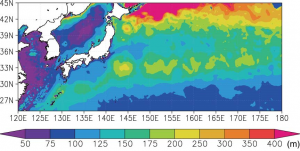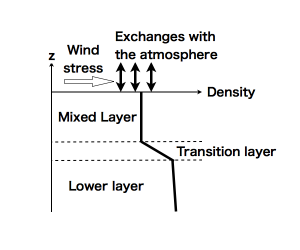Tomoki Tozuka
Role of mixed layer depth variations in the Pacific Decadal Oscillation
Research Summary
In the upper ocean, a mixed layer with almost uniform density exists (Figure 1). Since heat, freshwater, and momentum are exchanged between the ocean and the atmosphere, the mixed layer plays an important role in ocean-atmosphere interactions. The principal investigator have revealed that changes in sensitivity to surface heat fluxes associated with changes in the mixed layer thickness plays a key role in generation of sea surface temperature anomalies.
In this study, using outputs from an ocean general circulation model, ocean assimilation products, and outputs from a coupled general circulation model with 18.6-year period tidal mixing, we examine how long-term variations of mixed layer depth influence the North Pacific decadal climate variability through their influence on the sensitivity to surface heat fluxes (Figure 2). As an application, the Southern Hemisphere decadal climate variability will also be discussed.

Figure 2: January climatology of the mixed layer depth in the northwestern Pacific simulated by a high-resolution ocean general circulation model.
 Principal investigator:
Principal investigator:
Tomoki Tozuka
Associate Professor, Department of Earth and Planetary Science, Graduate School of Science, The University of Tokyo, Physical Oceanography/Climate Dynamics
http://www-aos.eps.s.u-tokyo.ac.jp/~tozuka/indexe.html


